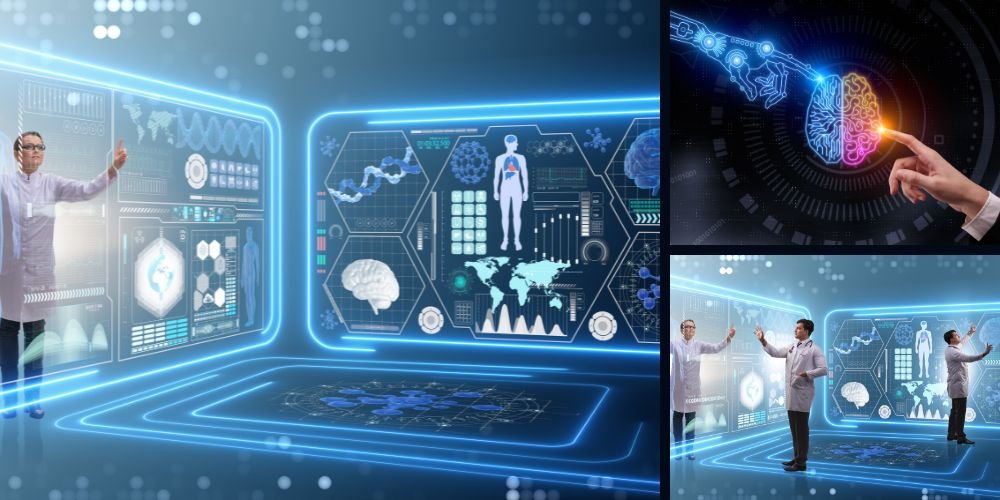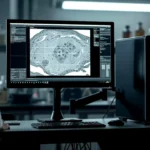Artificial Intelligence (AI) has emerged as a transformative force in the rapidly evolving healthcare landscape, reshaping how medical professionals approach diagnostics, treatment, and patient care. This article delves into the significance of AI in healthcare, its evolution, applications, challenges, and the immense potential it holds for the future of medicine.
Significance of Artificial Intelligence in Healthcare
Artificial intelligence in healthcare is of profound significance, leveraging advanced algorithms and computational power to analyze complex medical data, improve decision-making, and enhance overall patient outcomes. Integrating AI technologies into medical practices promises to revolutionize healthcare delivery, making it more efficient, personalized, and accessible.
Precision Diagnostics and Imaging
AI plays a pivotal role in precision diagnostics by accurately and efficiently analyzing medical imaging data, surpassing traditional methods. Machine learning algorithms can identify subtle patterns, anomalies, and early signs of disease in medical images, such as X-rays, CT scans, and MRIs, aiding healthcare professionals in making more accurate, timely diagnoses.
Predictive Analytics and Personalized Treatment
By analyzing vast datasets, including electronic health records and genomic information, AI enables predictive analytics to assess an individual’s risk for certain diseases. This information facilitates personalized treatment plans, optimizing interventions based on the patient’s unique genetic makeup, lifestyle, and medical history.
Virtual Health Assistants and Telemedicine
The advent of AI-powered virtual health assistants has transformed the telemedicine landscape. Chatbots and virtual assistants can provide initial assessments, answer patient queries, and even schedule appointments, enhancing accessibility to healthcare services, especially in remote or underserved areas.
Evolution of Artificial Intelligence in Healthcare
The evolution of AI in healthcare has been marked by technological advancements, increased computing power, and the development of sophisticated algorithms tailored for medical applications.
Machine Learning and Deep Learning
Machine learning and deep learning algorithms form the backbone of AI applications in healthcare. These technologies allow computers to learn from large datasets, recognize patterns, and continuously improve performance. Deep learning, in particular, has demonstrated remarkable capabilities in image recognition and natural language processing tasks.
Natural Language Processing (NLP) and Healthcare Informatics
Natural Language Processing (NLP) enables AI systems to understand and interpret human language, extracting valuable information from clinical notes, research papers, and other unstructured data sources. It facilitates better data utilization for research, decision support, and the improvement of healthcare informatics.
Robotics and AI-Assisted Surgery
Integrating AI with robotics has led to significant advancements in surgical procedures. AI-assisted surgery systems can enhance the precision and efficiency of surgeries, reduce recovery times, and improve overall patient outcomes. Surgeons can benefit from real-time data analysis and guidance during complex procedures.
Applications of Artificial Intelligence in Healthcare
Artificial intelligence finds diverse applications across healthcare domains, offering solutions to complex challenges and improving the efficiency of medical practices.
Drug Discovery and Development
AI accelerates drug discovery and development by analyzing biological data to identify potential drug candidates, predict their efficacy, and optimize formulations. It can significantly reduce the time and costs of bringing new medications to market.
Population Health Management
AI contributes to population health management by analyzing large datasets to identify trends, predict disease outbreaks, and formulate preventive care strategies. This proactive approach helps healthcare providers allocate resources effectively and tailor interventions to specific population health needs.
Cybersecurity and Health Data Protection
As healthcare systems digitize patient records and rely on interconnected technologies, AI is employed to enhance cybersecurity measures. AI-driven solutions can detect and mitigate potential security threats, safeguarding sensitive health data from unauthorized access and cyberattacks.
Challenges in the Implementation of Artificial Intelligence in Healthcare
While AI’s potential benefits in healthcare are immense, some challenges must be addressed to enable widespread, responsible implementation.
Data Privacy and Ethical Concerns
AI in healthcare involves handling vast amounts of sensitive patient data. Ensuring robust data privacy measures and addressing ethical concerns about consent, transparency, and bias in AI algorithms are critical for maintaining public trust.
Integration with Existing Healthcare Systems
Integrating AI technologies with existing healthcare systems and workflows presents challenges related to interoperability, training healthcare professionals, and adapting to regulatory requirements. Seamless integration is essential for maximizing AI’s impact on patient care.
Regulatory Compliance and Standards
The evolving nature of AI technologies poses challenges for regulatory bodies in establishing clear standards and guidelines. Striking a balance between fostering innovation and ensuring patient safety requires ongoing collaboration between healthcare stakeholders and regulatory authorities.
Future Directions of Artificial Intelligence in Healthcare
The future of artificial intelligence in healthcare is marked by ongoing innovation, collaborative research, and the development of solutions to address current challenges.
Explainable AI and Trust
Enhancing the explainability of AI algorithms is crucial for building trust among healthcare professionals and patients. Transparent AI systems that provide an understandable rationale for their decisions will be essential for widespread acceptance and adoption.
Continuous Learning and Adaptive Models
AI systems that can always learn and adapt to new data, emerging medical knowledge, and evolving patient needs will be at the forefront of healthcare innovation. Adaptive models can improve diagnostic accuracy and treatment recommendations over time.
Patient-Centric AI Solutions
The future of AI in healthcare will prioritize patient-centric solutions, empowering individuals to participate actively in their healthcare journeys. AI-driven tools for health monitoring, personalized health plans, and virtual health assistants will become integral components of patient care.
Conclusion
Artificial intelligence in healthcare represents a paradigm shift in how medical professionals approach patient care, diagnostics, and medical research. As technology advances, the collaboration between AI systems and healthcare professionals promises more precise, personalized, and accessible healthcare. While challenges persist, the ongoing commitment to ethical practices, transparency, and innovation will pave the way for a future in which AI contributes significantly to improved health outcomes and the overall well-being of individuals and communities.





